

Authentic Assessment Toolbox Home Page. To the Authentic Assessment Toolbox, a how-to text on creating authentic tasks, rubrics, and standards for measuring and improving student learning.
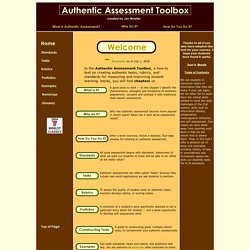
Inside, you will find chapters on A good place to start -- In this chapter I identify the characteristics, strengths and limitations of authentic assessment; compare and contrast it with traditional (test-based) assessment. Why has authentic assessment become more popular in recent years? When can it best serve assessment needs? After a brief overview, follow a detailed, four-step process for creating an authentic assessment. All good assessment begins with standards: statements of what we want our students to know and be able to do. Authentic assessments are often called "tasks" because they include real-world applications we ask students to perform. To assess the quality of student work on authentic tasks, teachers develop rubrics, or scoring scales. Workshops: Writing a Good Standard. Workshop: Writing a Good Standard In the "workshops" sprinkled throughout this website I will attempt to capture (and model) the process I follow when assisting someone or some group in developing standards or authentic tasks or rubrics.
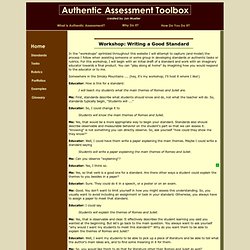
For this workshop, I will begin with an initial draft of a standard and work with an imaginary educator towards a final product. You can "play along at home" by imagining how you would respond to the educator or to me. Somewhere in the Smoky Mountains .... (hey, it's my workshop; I'll host it where I like!) Educator: How is this for a standard: I will teach my students what the main themes of Romeo and Juliet are. Me: First, standards describe what students should know and do, not what the teacher will do. Authentic Student Learning. College-Wide Learning Outcomes - NorQuest College. NorQuest College is a unique and inclusive post–secondary institution that serves individuals and communities by functioning as a catalyst for change through learning.
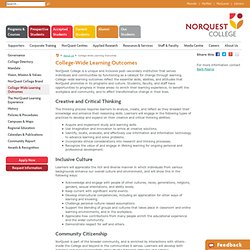
College–wide learning outcomes reflect the essential skills, abilities, and attitudes that NorQuest promotes in its programs and culture. Students, faculty, and staff have opportunities to progress in these areas–to enrich their learning experience, to benefit the workplace and community, and to effect transformative change in their lives. Creative and Critical Thinking The thinking process requires learners to analyze, create, and reflect as they broaden their knowledge and enhance their reasoning skills. Learners will engage in the following types of practices to develop and expand on their creative and critical thinking abilities: Wilfrid Laurier University - Teaching Support Services - Quality Assurance Office - Learning Outcomes. One of the most significant changes to the Laurier’s revised (2011) Institutional Quality Assurance Procedures (IQAP) is the focus on program-level learning outcomes.
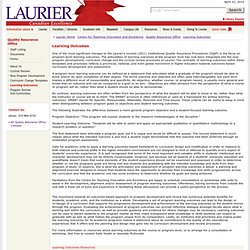
The articulation of learning outcomes at the program level has now been integrated into the new program development, curriculum change and the cyclical review processes at Laurier. The centrality of learning outcomes within these templates and processes reflects a provincial, national, and even global movement in higher education towards outcomes-based curriculum development and assessment. A program-level learning outcome can be defined as a statement that articulates what a graduate of the program should be able to know and/or do upon completion of their degree. The terms outcome and objective are often used interchangeably, but each term implies a different level of measurability and specificity. The following illustrates the difference between a more general program objective and a student-focused learning outcome.
Learning Outcomes & Assessment - VP Academic. Terms of Reference Preamble SFU's academic plan, and the NWCCU accreditation process, commit us to improving and diversifying the student academic experience.
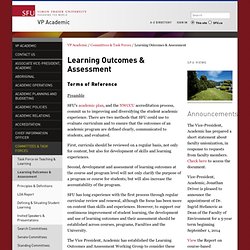
There are two methods that SFU could use to evaluate curriculum and to ensure that the outcomes of an academic program are defined clearly, communicated to students, and evaluated. First, curricula should be reviewed on a regular basis, not only for content, but also for development of skills and learning experiences. Second, development and assessment of learning outcomes at the course and program level will not only clarify the purpose of a program or course for students, but will also increase the accountability of the program. SFU has long experience with the first process through regular curricular review and renewal, although the focus has been more on content than skills and experiences. Draft principles to guide the establishment and use of learning outcomes for curricular assessment at SFU. Membership.